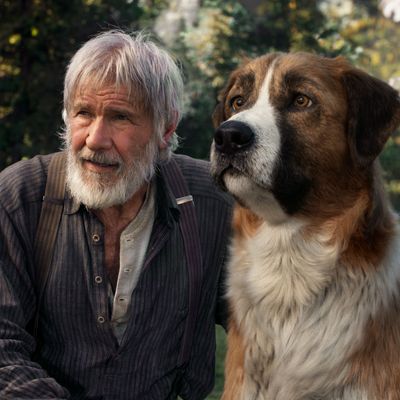
In the newest adaptation of Jack London’s venerable 1903 novel The Call of the Wild, a huge, domesticated St. Bernard-Collie mix named Buck is dognapped and put to work pulling sleds at the height of the Yukon’s Klondike Gold Rush, where — under threat from vicious alpha dogs, deranged humans, and the harsh Arctic landscape — he feels the first stirrings of those ancient instincts that have ensured the survival of his species for millennia: empathy, tolerance, patience, generosity, and extreme cuteness. Gosh, is Buck a sweetie. He has no dialogue, but as computer-generated by the folks at MPC, he looks a second away from exclaiming “Ruh-roh”; and he’s apt to roll his eyes at mammals who behave irrationally — among them an alcoholic prospector named John Thornton (Harrison Ford), whom Buck successfully stares into sobriety. He’s a sobriety dog! The big mutt humanizes everything he touches.
Not to belabor the obvious, but this runs counter to the original story’s entire fucking reason for being, and the discontinuity is stupefying: Scene by scene, the movie cancels itself out. On account of Jack London’s disturbing public hostility toward Asian immigration and fondness for eugenics, his reputation is understandably not what it was in the first half of the 20th century, but The Call of the Wild is an enthralling book, and scenes like the one in which a congenial newbie exposes its flanks to the team of sled dogs and is promptly ripped to shreds retain their Darwinian force. As Buck considers whether to pounce on a weakened foe or to pull back, London delivers one of many thesis statements:
“Mercy did not exist in the primordial life. It was misunderstood for fear, and such misunderstandings made for death. Kill or be killed, eat or be eaten, was the law; and this mandate, down out of the depths of Time, [Buck] Obeyed.”
Here’s one more, just for the lolz:
“The blood-longing became stronger than ever before. He was a killer, a thing that preyed, living on the things that lived, unaided, alone, by virtue of his own strength and prowess, surviving triumphantly in a hostile environment where only the strong survived.”
It’s not hard to imagine what London would think of the scene in the movie where Buck and his pals playfully chase a rabbit and are stunned into silence when the alpha dog, Spitz, chomps down on the poor little creature’s back. As the pack stares in vegan-ish disbelief, Buck realizes, sadly, that Spitz is not meant for the Wild as depicted by director Chris Sanders, screenwriter Michael Green, and the Disney Company’s renamed “20th Century Studios.” (The absence of “Fox” from the new logo seems weirdly apposite.) There’s some dogfighting ahead, though nothing that would trouble a Quaker elementary school class.
Sanders is best known for directing Lilo & Stitch and How to Train Your Dragon, and I’d argue that he still hasn’t made his live-action debut. This is The Call of the Computer-Generated, in which the mighty landscape feels homogenized and John Powell’s incessantly sentimental score keeps all traces of unruliness at bay. By the time a white female timber wolf — the movie’s equivalent of a Beautiful Blonde — came on the scene and held Buck’s gaze, I found myself wishing for the grit of Bambi. I did enjoy watching a hoary Harrison Ford, who looks quite at home in the company of a large, shaggy beast (though Chewbacca was less of a party pooper). Even in saccharine settings, Ford’s fundamental surliness comes through. His bad nature can’t be tamed.
It might be argued that a movie as smoothly crafted as this one doesn’t deserve such a critical shredding, but I think London’s story is more important than ever to know in its original form, and that a Call of the Wild without wildness is all too emblematic of a world that has been made over into a corporate theme park. Something sure is screwy when a kid needs to go back to old Warner Bros. cartoons in which coyotes with jet-propelled tennis shoes or do-it-yourself tornado kits come closer to suggesting how nature actually works.


